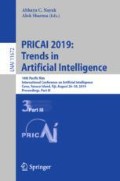Abstract
The parameters of any machine learning (ML) model are obtained from the dataset on which the model is trained. However, existing research reveals that many datasets appear to have strong build-in biases. These biases are inherently learned by the learning mechanism of the ML model which adversely affects their generalization performance. In this research, we propose a new supervised data augmentation mechanism which we call as Data Augmentation Pursuit (DAP). The DAP generates labelled synthetic data instances for augmenting the raw datasets. To demonstrate the effectiveness of utilizing DAP for reducing model bias, we perform comprehensive experiments on real world image dataset. CNN models trained on augmented dataset obtained using DAP achieves significantly better classification performance and exhibits reduction in the bias learned by their learning mechanism.
Access this chapter
Tax calculation will be finalised at checkout
Purchases are for personal use only
References
Arjovsky, M., Chintala, S., Bottou, L.: Wasserstein generative adversarial networks. In: Precup, D., Teh, Y.W. (eds.) Proceedings of the 34th International Conference on Machine Learning. Proceedings of Machine Learning Research, 06–11 August 2017, vol. 70, pp. 214–223. PMLR, International Convention Centre, Sydney, Australia (2017)
Brain, D., Webb, G.I.: The need for low bias algorithms in classification learning from large data sets. In: Elomaa, T., Mannila, H., Toivonen, H. (eds.) PKDD 2002. LNCS, vol. 2431, pp. 62–73. Springer, Heidelberg (2002). https://doi.org/10.1007/3-540-45681-3_6
Chen, X., Duan, Y., Houthooft, R., Schulman, J., Sutskever, I., Abbeel, P.: InfoGAN: interpretable representation learning by information maximizing generative adversarial nets. In: Advances in Neural Information Processing Systems, pp. 2172–2180 (2016)
Coates, A., Ng, A., Lee, H.: An analysis of single-layer networks in unsupervised feature learning. In: Proceedings of the Fourteenth International Conference on Artificial Intelligence and Statistics, pp. 215–223 (2011)
Goodfellow, I., et al.: Generative adversarial nets. In: Advances in Neural Information Processing Systems, pp. 2672–2680 (2014)
Gulrajani, I., Ahmed, F., Arjovsky, M., Dumoulin, V., Courville, A.: Improved training of Wasserstein GANs. In: NIPS (2017)
Khosla, A., Zhou, T., Malisiewicz, T., Efros, A.A., Torralba, A.: Undoing the damage of dataset bias. In: Fitzgibbon, A., Lazebnik, S., Perona, P., Sato, Y., Schmid, C. (eds.) ECCV 2012. LNCS, vol. 7572, pp. 158–171. Springer, Heidelberg (2012). https://doi.org/10.1007/978-3-642-33718-5_12
Kleinberg, J., Mullainathan, S., Raghavan, M.: Inherent trade-offs in the fair determination of risk scores. In: ITCS (2017)
Kohavi, R., Wolpert, D.H., et al.: Bias plus variance decomposition for zero-one loss functions. In: Machine Learning, Proceedings of the Thirteenth International Conference (ICML), pp. 275–283 (1996)
Kohli, N., Yadav, D., Vatsa, M., Singh, R., Noore, A.: Synthetic iris presentation attack using iDCGAN. In: IJCB (2017)
Krizhevsky, A., Hinton, G.: Learning multiple layers of features from tiny images. Department of Computer Science, University of Toronto (2009)
Kuncheva, L.I., Whitaker, C.J.: Measures of diversity in classifier ensembles and their relationship with the ensemble accuracy. Mach. Learn. 51(2), 181–207 (2003)
Liu, M.Y., Tuzel, O.: Coupled generative adversarial networks. In: Advances in Neural Information Processing Systems, pp. 469–477 (2016)
McLaughlin, N., Del Rincon, J.M., Miller, P.: Data-augmentation for reducing dataset bias in person re-identification. In: 2015 12th IEEE International Conference on Advanced Video and Signal Based Surveillance (AVSS). IEEE (2015)
Paulin, M., Revaud, J., Harchaoui, Z., Perronnin, F., Schmid, C.: Transformation pursuit for image classification. In: Proceedings of the IEEE Conference on Computer Vision and Pattern Recognition, pp. 3646–3653 (2014)
Radford, A., Metz, L., Chintala, S.: Unsupervised representation learning with deep convolutional generative adversarial networks. In: ICLR (2016)
Salimans, T., Goodfellow, I., Zaremba, W., Cheung, V., Radford, A., Chen, X.: Improved techniques for training GANs. In: Advances in Neural Information Processing Systems, pp. 2234–2242 (2016)
Sato, I., Nishimura, H., Yokoi, K.: APAC: augmented pattern classification with neural networks. arXiv preprint arXiv:1505.03229 (2015)
Shmelkov, K., Schmid, C., Alahari, K.: How good is my GAN? In: Ferrari, V., Hebert, M., Sminchisescu, C., Weiss, Y. (eds.) ECCV 2018. LNCS, vol. 11206, pp. 218–234. Springer, Cham (2018). https://doi.org/10.1007/978-3-030-01216-8_14
Shrivastava, A., Pfister, T., Tuzel, O., Susskind, J., Wang, W., Webb, R.: Learning from simulated and unsupervised images through adversarial training. In: Proceedings of the IEEE Conference on Computer Vision and Pattern Recognition, pp. 2242–2251 (2017)
Szegedy, C., et al.: Going deeper with convolutions. In: Proceedings of the IEEE Conference on Computer Vision and Pattern Recognition, pp. 1–9 (2015)
Tommasi, T., Patricia, N., Caputo, B., Tuytelaars, T.: A deeper look at dataset bias. In: Csurka, G. (ed.) Domain Adaptation in Computer Vision Applications. ACVPR, pp. 37–55. Springer, Cham (2017). https://doi.org/10.1007/978-3-319-58347-1_2
Torralba, A., Efros, A.A.: Unbiased look at dataset bias. In: 2011 IEEE Conference on Computer Vision and Pattern Recognition (CVPR). IEEE (2011)
Xian, Y., Lorenz, T., Schiele, B., Akata, Z.: Feature generating networks for zero-shot learning. In: CVPR (2018)
Zhu, J.Y., Park, T., Isola, P., Efros, A.A.: Unpaired image-to-image translation using cycle-consistent adversarial networks. In: ICCV (2017)
Author information
Authors and Affiliations
Corresponding author
Editor information
Editors and Affiliations
Rights and permissions
Copyright information
© 2019 Springer Nature Switzerland AG
About this paper
Cite this paper
Verma, S., Wang, C., Zhu, L., Liu, W. (2019). Towards Effective Data Augmentations via Unbiased GAN Utilization. In: Nayak, A., Sharma, A. (eds) PRICAI 2019: Trends in Artificial Intelligence. PRICAI 2019. Lecture Notes in Computer Science(), vol 11672. Springer, Cham. https://doi.org/10.1007/978-3-030-29894-4_45
Download citation
DOI: https://doi.org/10.1007/978-3-030-29894-4_45
Published:
Publisher Name: Springer, Cham
Print ISBN: 978-3-030-29893-7
Online ISBN: 978-3-030-29894-4
eBook Packages: Computer ScienceComputer Science (R0)

